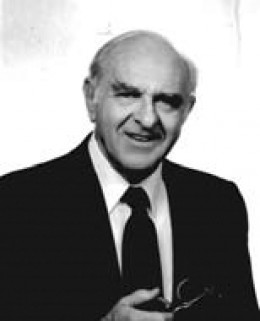One-Percenters: Foster faculty among the most-cited scientific researchers in the world
A Stanford University study has counted seven faculty members of the University of Washington Foster School of Business among the top 1% of the world’s most-cited researchers, across all scientific disciplines. Nine Foster professors are in the top 1.5%.
This new index of scholarly influence, published in the journal PLOS Biology, was constructed from a sweeping analysis of citation data from 1996 to 2019 on the research of 6,880,389 scientists who have published at least five papers in any of 22 major disciplines, ranging from biology to engineering to economics to management. The database lists the top 2% of scholars—more than 100,000 names in total.
Among the top 1.5% of the planet’s most-cited researchers are Bruce Avolio, Suresh Kotha, Charles Hill, Terence Mitchell, Thomas Jones and Xiao-Ping Chen from Foster’s Department of Management and Organization; Jonathan Karpoff and Jarrad Harford from the Department of Finance and Business Economics; and Robert Palmatier from the Department of Marketing and International Business.
 The highest-rated member of Foster’s contingent is Bruce Avolio, a professor of management and the Mark Pigott Chair in Business Strategic Leadership. Avolio, an authority in leadership development, is ranked in the top 0.06% of most-cited scientific researchers overall, and #25 among the 36,319 researchers in the category of business & management.
The highest-rated member of Foster’s contingent is Bruce Avolio, a professor of management and the Mark Pigott Chair in Business Strategic Leadership. Avolio, an authority in leadership development, is ranked in the top 0.06% of most-cited scientific researchers overall, and #25 among the 36,319 researchers in the category of business & management.
Avolio is the founding executive director of Foster’s Center for Leadership and Strategic Thinking, and the author of nearly 150 published papers and over a dozen books. He is the recipient of the 2013 Eminent Leadership Scholar Award from the Academy of Management’s Network of Leadership Scholars.
A 2019 study in The Leadership Quarterly ranked Avolio the #1 scholar in the world at connecting authors in the field of leadership research, and #2 in productivity and influence of his leadership studies. An index published that same year in the journal Academy of Management Learning and Education listed Avolio the #3 most-influential author in the field of organizational behavior. And a 2008 Journal of Management study ranked him the #133 most-influential management scholar of all time—a position that would surely advance if it were recalculated today.
 Jonathan Karpoff, a professor of finance and the Washington Mutual Endowed Chair in Innovation, is ranked in the top 0.6% of most-cited scientists overall, and #56 among the 9,626 finance scholars in the index.
Jonathan Karpoff, a professor of finance and the Washington Mutual Endowed Chair in Innovation, is ranked in the top 0.6% of most-cited scientists overall, and #56 among the 9,626 finance scholars in the index.
Karpoff is an expert in corporate finance, governance and crime and punishment. He has received numerous research awards, including the Outstanding Contributions to Research in Corporate Governance Award from the Drexel Center for Corporate Governance (2015), the William F. Sharpe Award for Scholarship in Financial Research (2012), and the Griliches Prize in Empirical Economics (2003).
Both a fellow (inducted in 2016) and board member of the prestigious Financial Management Association, he also serves on the steering committee of the Financial Economists Roundtable and as associate editor of four major academic journals. He previously served as managing editor of the Journal of Financial and Quantitative Analysis and president of the Financial Management Association International, and is a former international research fellow at the Oxford University Centre for Corporate Reputation.
 Jarrad Harford, the Paul Pigott-PACCAR Professor of Finance, is in the top 0.8% of most-cited researchers overall, and #86 among the 9,626 finance scholars in the index.
Jarrad Harford, the Paul Pigott-PACCAR Professor of Finance, is in the top 0.8% of most-cited researchers overall, and #86 among the 9,626 finance scholars in the index.
Harford is chair of the Department of Finance and Business Economics, and a renowned investigator of corporate finance, business valuation, corporate governance, mergers and acquisitions, dividend and payout policy/stock splits, and private equity. He is the author of the textbook Fundamentals of Corporate Finance, managing editor of the Journal of Financial and Quantitative Analysis and associate editor of the Journal of Financial Economics and the Journal of Corporate Finance.
Beyond his extraordinary research acumen, Harford is also a five-time recipient of the Foster School’s Undergraduate Professor of the Year Award.
 Suresh Kotha, a professor of management and Oleson/Battelle Excellence Chair in Entrepreneurship, is in the top 0.9% of highly cited researchers overall, and #566 among the 36,319 researchers in the business & management category.
Suresh Kotha, a professor of management and Oleson/Battelle Excellence Chair in Entrepreneurship, is in the top 0.9% of highly cited researchers overall, and #566 among the 36,319 researchers in the business & management category.
Kotha is the chair of the Department of Management and Organization, research director of the Arthur W. Buerk Center for Entrepreneurship, and co-founder of the West Coast Research Symposium on Technology Entrepreneurship.
He is credited with more than 40 publications in the areas of competitive strategy, corporate entrepreneurship and technology entrepreneurship, and is the recipient of numerous awards for research and teaching. He also serves as field editor of the Journal of Business Venturing and on the editorial board of the Strategic Management Journal.
 Rob Palmatier, a professor of marketing and the John C. Narver Endowed Professor in Business Administration, is in the top 0.9% overall, and #114 among the 10,464 marketing researchers in the index.
Rob Palmatier, a professor of marketing and the John C. Narver Endowed Professor in Business Administration, is in the top 0.9% overall, and #114 among the 10,464 marketing researchers in the index.
He has published 74 papers and nine books since 2004, offered insights to CRM marketing, loyalty programs, online marketing, data analytics, sales management and sales channels and retail management. Among his enormous haul of awards is the 2020 Lifetime Achievement Award from the Interorganizational Research Group of the American Marketing Association, and its 2019 Vijay Mahajan Award for career contributions to marketing strategy.
Palmatier is co-editor of the Journal of Marketing and founding research director of the Foster School’s Center for Sales and Marketing Strategy.
 Charles Hill, a professor of management and organization and the Hughes M. and Katherine G. Blake Endowed Professor in Business Administration, is in the top 0.9% of most-cited researchers overall and #590 among the 36,319 in the business & management category.
Charles Hill, a professor of management and organization and the Hughes M. and Katherine G. Blake Endowed Professor in Business Administration, is in the top 0.9% of most-cited researchers overall and #590 among the 36,319 in the business & management category.
Hill is both a legendary instructor (he has won numerous Foster teaching awards and been named a Favorite MBA Professor by Poets & Quants) and impactful researcher of competitive strategy (a 2008 Journal of Management study ranked him #40 among the most-influential management scholars of all time and a 2018 Academy of Management report found him the #6 most-cited researcher in strategic management textbooks).
But Hill’s broadest impact may come from his own blockbuster textbooks: Strategic Management, Global Business Today, and International Business, which has reigned at #1 in its category for more than 25 years and is translated into 14 languages.
 Terry Mitchell, a professor emeritus of management, is in the top 0.9% of citations overall, and ranks #235 of 36,319 researchers in business & management.
Terry Mitchell, a professor emeritus of management, is in the top 0.9% of citations overall, and ranks #235 of 36,319 researchers in business & management.
His 139 papers and four books published since 1969 include groundbreaking research in leadership, motivation, decision making and employee turnover. In 2010 Mitchell received the Lifetime Achievement Award from the Organizational Behavior Division of the Academy of Management. In 2013, the AoM’s Human Resources Division granted him its Scholarly Achievement Award.
Mitchell is a fellow of the AoM, the American Psychological Association and the Society for Industry and Organizational Psychology, from which he received the Distinguished Scientific Contribution Award in 1998. A 2008 study in the Journal of Management ranked him #35 among the most-influential management scholars of all time.
Tom Jones, a professor emeritus of management, is in the top 1.3% of most-cited scientists overall, and #820 of the 36,319 researchers in business & management.
Jones is a trailblazing scholar of corporate ethics. His “ethical continuum” of corporate approaches to stakeholders won the 2007 Best Paper Award from the International Association for Business and Society. His proposal of “stakeholder happiness” as a neo-utilitarian objective for the modern corporation earned him the 2013 Best Article in Business Ethics Quarterly. And his 1991 Academy of Management Review paper on ethical decision making by individuals in organizations was ranked the #11 most-cited article of all time in management textbooks.
At Foster, Jones won the Dean’s Research Award in 2000 and the Dean’s Citizenship Award in 2003. He is the founding editor of the journal Business & Society and received the 2005 Sumner Marcus Award for lifetime achievement from the Social Issues in Management Division of the Academy of Management.
 Xiao-Ping Chen, a professor of management and the Philip M. Condit Endowed Chair in Business Administration, is in the top 1.4% of citations overall, and #869 among the 36,319 researchers in business & management.
Xiao-Ping Chen, a professor of management and the Philip M. Condit Endowed Chair in Business Administration, is in the top 1.4% of citations overall, and #869 among the 36,319 researchers in business & management.
Chen has earned many accolades for her examinations of inter-cultural communication, entrepreneurial passion, leadership and creativity, and Chinese guanxi. She received the 2019 Scholarly Impact Award from the Journal of Management, the 2016 Distinguished Scholarly Contribution Award from the International Association for Chinese Management Research, and was named Outstanding UW Woman in 2010. She is the author of 11 books and the co-creator of icEdge, an assessment of communication style.
The former associate dean for faculty and academic affairs at Foster is a fellow of the Academy of Management, the American Psychological Association and the Society for Industrial and Organizational Psychology. She is the editor of the journal Management Insights, incoming editor of Management and Organization Review, and past editor-in-chief of Organizational Behavior and Human Decision Processes.
 Also appearing in the index is the late Fred Fiedler, a professor of management and psychology at the UW from 1969 until his retirement in 1993, who is ranked in the top 1.4% of highly cited scientific researchers overall and #874 among the 36,319 researchers in business & management.
Also appearing in the index is the late Fred Fiedler, a professor of management and psychology at the UW from 1969 until his retirement in 1993, who is ranked in the top 1.4% of highly cited scientific researchers overall and #874 among the 36,319 researchers in business & management.
Fiedler authored more than 200 scientific papers and several books in his long career, but is best known for introducing the “Fiedler Contingency Model,” which changed the way we view effective leadership from a function of individual traits and style to a process that responds to organizational and situational context.
Among numerous awards, Fiedler received the Stogdill Award for Distinguished Contributions to leadership, the Outstanding Scientific Contributions Award from SIOP and the Distinguished Educator Award from the Academy of Management. A 2018 AoM report ranked him as the #32 most-cited author in management textbooks. Fiedler died in 2017.

